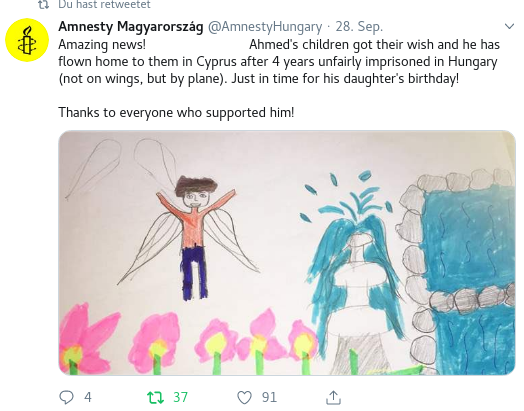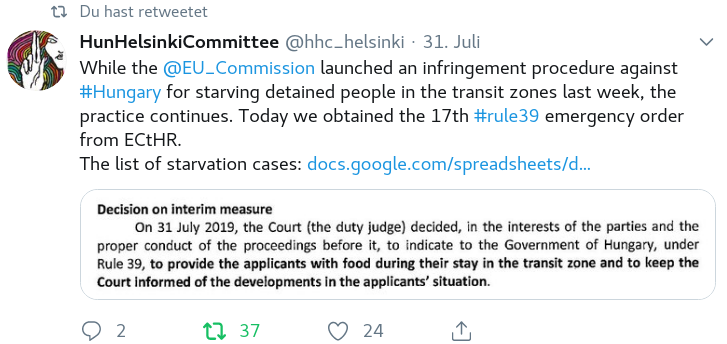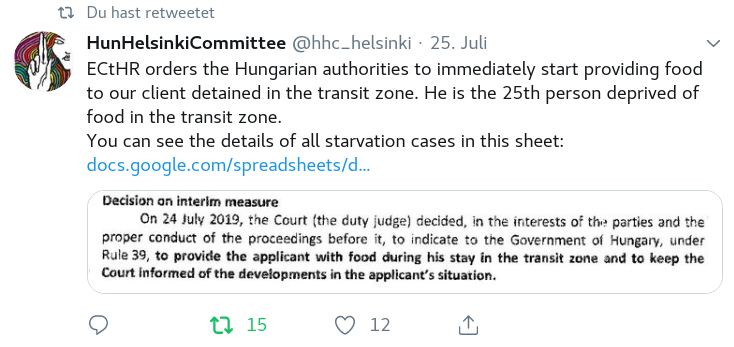Die ungarische Polizei hat am Freitag dutzende Flüchtlinge in einem selbst gebauten Tunnel unter der Grenze zu Serbien entdeckt. Insgesamt seien zwei Tunnel nahe der Stadt Asotthalom und Csikeria im Süden des Landes enttarnt worden, teilte die Polizei am Freitag mit. In dem Tunnel nahe Asotthalom seien 44 Flüchtlinge aufgegriffen worden.
EGMR: Hungary violated the rights of two asylum-seekers by expelling them to Serbia but their stay in a border transit zone was not deprivation of liberty
The case of Ilias and Ahmed v. Hungary (application no. 47287/15) concerned two asylum-seekers from Bangladesh who spent 23 days in a Hungarian border transit zone before being removed to Serbia after their asylum applications were rejected. In today’s Grand Chamber judgment 1 the European Court of Human Rights held, unanimously, that there had been a violation of Article 3 (prohibition of torture or inhuman or
degrading treatment) of the European Convention on Human Rights owing to the applicants’ removal to Serbia, and,
no violation of Article 3 as regards the conditions in the transit zone, and, by a majority, that the applicants’ complaints under Article 5 §§ 1 and 4 (right to liberty and security) had to be rejected as inadmissible.
The Court found in particular that the Hungarian authorities had failed in their duty under Article 3 to assess the risks of the applicants not having proper access to asylum proceedings in Serbia or being subjected to chain-refoulement, which could have seen them being sent to Greece, where conditions in refugee camps had already been found to be in violation of Article 3.
In a development of its case-law, it held that Article 5 was not applicable to the applicants’ case as there had been no de facto deprivation of liberty in the transit zone. Among other things, the Court found that the applicants had entered the transit zone of their own initiative and it had been possible in practice for them to return to Serbia, where they had not faced any danger to their life or health.
Their fears of a lack of access to Serbia’s asylum system or of refoulement to Greece, as expressed under Article 3, had not been enough to make their stay in the transit zone involuntary.
Vertragsverletzungsverfahren

Hungary: Commission takes next step in the infringement procedure for non-provision of food in transit zones
Today, the European Commission decided to address a reasoned opinion to Hungary concerning the non-provision of food to persons held in the Hungarian transit zones at the border with Serbia. This concerns persons whose applications for international protection have been rejected, and who are waiting to be returned to a third country.
THE MAN WHO DEFEATED THE HUNGARIAN ASYLUM SYSTEM. REFUGEE STATUS GRANTED TO RUSSIAN ASYLUM-SEEKER AFTER SIX YEARS
Last week a desperate “ping-pong game” between the Hungarian asylum authority and a court in Pécs, Hungary came to an end on behalf of a man who suffered so much over years. Alexei Torubarov, who was politically persecuted by the Putin regime, has been recognised as a refugee. The lawsuit of the Hungarian Helsinki Committee’s client also reached the Court of Justice of the European Union (CJEU) which rendered its judgment applicable in all member states of the European Union: the court has the right to grant protection if in a previous appeals procedure the asylum authority ignored the court’s decision. With this recent judgment in Pécs, a domestic court first applied the CJEU’s ruling. Torubarov’s victory now gives hope to many other asylum seekers who are being arbitrarily denied asylum
AhMED H. Ist Zurück bei seiner Familie

HUNGARY: GOVERNMENT EXTENDS THE “STATE OF CRISIS DUE TO MASS MIGRATION”
On 6 September 2019, the Hungarian Government announced it would extend the “state of crisis due to mass migration” until 7 March 2020 to protect the country’s security and borders. To justify this extension, the Government referred to the 7,000 irregular border crossing attempts that have been registered since the beginning of the year as well as to the “critical situation in Serbia and the thousand illegal migrants in Bosnia and Herzegovina and some 30,000 migrants in Greece”. It further argued that, without Hungary’s southern fences and border control activities, the country would face a similar scenario to the so-called 2015 “migration crisis” and become the main transit route of irregular migration.
17. EGMR „Rule 39“ entscheidung

SZ: Orbán wehrt sich gegen Klage
Die EU-Kommission beanstandet Ungarns neue Asylgesetze. Es sei mit EU-Recht unvereinbar, Hilfeleistungen bei Asylanträgen weiter einzuschränken.
25. Fall des Aushungerns

